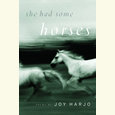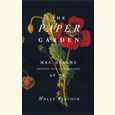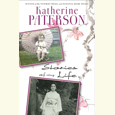Disappointed Idealist
Madison Smartt Bell discusses the life and work of novelist Robert Stone
In the preface to Child of Light, his biography of novelist Robert Stone, Madison Smartt Bell describes Stone as a man who “confronted the world with the bright, acidic irony of an extraordinarily perceptive, bitterly disappointed idealist.” It’s a vivid and precise summary of the complex artist who emerges in this comprehensive book, which follows Stone from his 1937 birth to a single mother in New York until his death at 77 in his Key West home, with his wife, Janice, by his side.
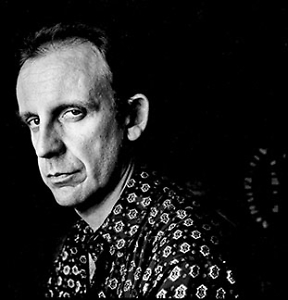
Stone was an admired short story writer and journalist, but he’s best known for his eight novels, including Dog Soldiers (1974), which won a National Book Award, and A Flag for Sunrise (1981), a Pulitzer Prize finalist. His final novel, Death of the Black-Haired Girl, was published in 2013. Stone’s protagonists are often American adventurers and expats drawn toward confrontations with the ugly flipside of exceptionalism. He has been compared to everyone from Melville to Conrad to Graham Greene to Flannery O’Connor.
Bell, author of 14 novels, including a critically acclaimed trilogy about the Haitian Revolution, examines Stone’s work as well as his life in Child of Light, and he argues persuasively for Stone’s unique place in American literature. “Comparisons serve best to set him apart,” Bell writes. “As for his work, there is nothing else quite like it in the entire American canon.”
An inveterate wanderer, Stone was fond of intoxicants and famously spent time among Ken Kesey’s Merry Pranksters, though he also enjoyed a remarkably stable marriage of more than 50 years with Janice Stone. Bell was a close friend of the couple and undertook the biography — which does not shy away from its subject’s flaws — with Janice’s full support.
Bell also served as editor for The Eye You See With, a volume of selected nonfiction by Stone, some of it previously unpublished, released this month by Houghton Mifflin Harcourt. Bell draws on some of this material in Child of Light, and the two books make for interesting companion reading, with Stone’s journalistic and critical voice enriching the biography’s portrait.
Bell answered questions from Chapter 16 via email.
Chapter 16: You note in Child of Light that Stone didn’t care much for celebrity. What do you hope readers will take away from your account of “a hell of an interesting life,” as Janice Stone describes it? How does a biography serve a deeper understanding of his work?
Madison Smartt Bell: Stone didn’t much care about the celebration of his personality. He cared about the celebration of his work quite a bit. So I’m taking the opportunity to do the latter directly; it’s a critical biography in the sense that it does contain detailed discussion of all his novels and many of his stories.
It was indeed an interesting life — and a typical American life in the sense of exemplifying our old belief that anybody who tries hard enough (and gets lucky) can rise from the most miserable poverty and deprivation to success and prosperity. Stone in fact performed that maneuver, although not in Horatio Alger style (a comparison I’m sure he would have scorned). In this very general way, he actually did live that version of the American dream, but he was also intensely, and intelligently, skeptical about it. Every major novel he wrote drills into disillusionment with some phase of American life in his time.
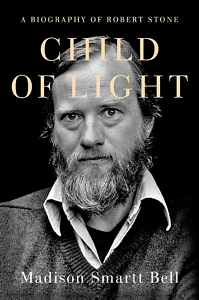 Chapter 16: What are the particular challenges of writing a biography of someone you knew well and admired?
Chapter 16: What are the particular challenges of writing a biography of someone you knew well and admired?
Bell: I’m not sure I thought about that consciously in the writing. A couple of reviews so far (Harper’s, American Conservative) have noted my lack of distance from the subject and then decided to forgive me for it. (I doubt I’ll be so lucky with everybody.) I think maybe an early conversation with Janice is relevant. I was still considering the project, as was she — I asked her how frank she wanted to be about a couple of dicey topics, and after some deliberation she said she thought Bob would want the whole truth told and that was what she wanted too. At that point I thought, okay, let’s do it.
Chapter 16: Was it difficult to decide how to handle your own place in the story?
Bell: That part I did think about. I saw right away that there’d be some scenes I could write vividly from my own point of view, but I couldn’t do the whole life that way, not having spent the time with Stone that Boswell did with Johnson. So there was an aesthetic problem of not having my first-person bits stick out awkwardly. That influenced me to try to make the whole have an oral history quality (I wrote that idea into the proposal), with many of my sources quoted extensively as first-person narrators — most prominently Janice, but a good many others too. Some of that aspect was filed down in editing (necessarily), but I think enough of it remains.
Chapter 16: Janice Stone’s voice is central in the biography, and she was a central figure in Stone’s career. She dedicated herself to supporting and enabling his work. Could he have been the writer he was without her?
Bell: No. I don’t think so. I mean, he was the one with the vision and talent, but he was also one of the great procrastinators of all time, and he had a lot of bad habits that would have proved fatal much sooner if not checked. Janice could get him to finish things, and I think he grew to depend on her doing that fairly early in the marriage. She organized all the practical details of their life and his career and also by Damascus Gate, if not before, was serving as the continuity person — reading over and arranging chapters and making sure the story tracked.
There’s a beautiful little piece he wrote on Malcolm Lowry, published for the first time in The Eye You See With. It doesn’t say “there but for the grace of Janice go I,” but I think it does mean that. Without her, there’d have been a lot less finished work and more than likely a much earlier grave.
Chapter 16: Stone’s spiritual concerns get considerable attention in Child of Light, and there’s a strong spiritual element in your own writing. Is that part of what originally drew you to his work?
Bell: Probably. Well, sure, there’s a considerable element of that in A Flag for Sunrise, the first one I read and the one that got me hooked. Stone was a cradle Catholic, which I am not, and as he said (as many have said) nobody leaves that completely behind, although he had a skeptical attitude toward it … combined with a longing for belief expressed in many different ways. We have, I reckon, both explored that desire though studying different religions and weaving them into our fiction. I at one time thought Renaissance Hermeticism had the answers! … later, Haitian Vodou. Stone said he found it in Kabbalah, at least in terms of eloquent, compelling expression of the desideratum.
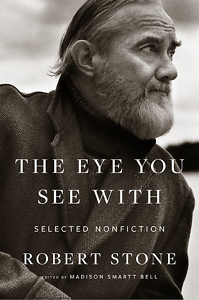 Chapter 16: Stone once said, “That is my subject. America and Americans,” and his work is often concerned with the disconnect between the American dream and the American conscience. Do you think anything about our current political and cultural moment would surprise him?
Chapter 16: Stone once said, “That is my subject. America and Americans,” and his work is often concerned with the disconnect between the American dream and the American conscience. Do you think anything about our current political and cultural moment would surprise him?
Bell: The extremism might. Or not. I thought I could see it coming in the 1990s — that the identity politics practiced so vigorously by the left would eventually produce a reactionary, exterminate-the-aliens movement on the right. I would bet Bob saw that in formation too, although we didn’t talk about it.
His first novel, A Hall of Mirrors, is seen by a good few readers as predictive of Trumpworld. In the novel’s climax, a white supremacy movement provokes a violent crisis, enabled by under-the-table machinations by a business guy. That episode is fueled by a corruption of the media quite similar to the evolution we’ve seen in our time: from Medal of Freedom winner Rush Limbaugh, through Fox News and the Balkanization of opinion facilitated by the internet, finally producing the hegemony of “alternative facts.” I would say that Stone deduced those mechanisms in that mid-1960s novel; they have become much more powerful since.
The intensity of vile political passions seems to me to have increased enormously, beginning in the 1980s, when people more or less on my side of street thought of Reagan as the Antichrist, or at best, dumber than the chimp he costarred with in Bedtime for Bonzo. George W. Bush was unthinkable as president to people on the left. Then, Never Trump, right?
No one (on that side of the street) could even conceive that such knaves could become our heads of state. What’s dawned on me more recently is that people on the other side of the street feel just as much incredulous outrage at the Clintons and Obama. These days, whatever party is out of power doesn’t just feel that its agenda has been set back. It feels that its nation has been kidnapped by criminal lunatics.
Stone would certainly have a thing or two to say about that situation, and there’s a number of us who wish he was here to do it. There might even have been a novel engaging such issues … .
Chapter 16: A previously unpublished short piece called “Coda” is included in The Eye You See With (and quoted extensively in Child of Light). It’s a deeply moving statement from an artist near the end of his life. Was there any hesitation about publishing such an intimate piece of work posthumously? What should an editor’s guiding principle be in making such a decision?
Bell: Too good to pass up. That’s the bottom line. I found it in Stone’s papers in their New York apartment, tidied it up a bit, and invited Lauren Wein, the HMH editor who’d engaged me to edit the collection, to come over and look at it. I wanted to prove I was worth my salt. You’d have to ask her to be sure, but my impression was that she experienced a moment of euphoria.
We didn’t look back. Truth to tell, it’s a fragment of something meant to be much longer, which tails off into …. Toward the end of his life Bob would sometimes go to sleep at the keyboard, producing quantities of what some people call cat-typing. So yeah, my edit could be questioned. But in Vodou belief, people who die don’t go anywhere — they remain invisibly near at hand — and when I did that cut (sitting at his desk, by the way) I felt him looking over my shoulder, not disapproving. Of course, that could always be delusional. Maybe I’ll get to find out later on.
Chapter 16: In an essay called “The Reason for Stories,” Stone writes, “The novelist has to cast the net of his sympathies fairly wide.” I’m struck by that “fairly.” Was anyone outside the net of Stone’s sympathies?
Bell: Not whole classes of people, I don’t think. Stone had a sort of wisdom of experience that inclined him to take people one at a time. Take Lieutenant Campos in A Flag for Sunrise — clearly a very bad guy, a serial rapist and murderous predator, who ends up slaying (and martyring) the heroine nun in novel’s climax. In the denouement, the Catholic priest Father Egan treats Campos with a sort of astral sympathy (one could also call it Christian compassion); thereby, Campos gains some sympathy in the eye of the reader.
Or consider the filmmaker Strickland in Outerbridge Reach — very evidently a sadistic creep. As a sadist, he’s a real virtuoso and more often than not will use his enormous talent to inflict pain on his subjects, recording these episodes so that he can savor their writhings at leisure later on. But Stone also makes Strickland a portrait of the artist (furnishing him with a good many of his own interests and insights); the guy is a very mixed bag.
In Stone’s fiction, characters devoid of redeemable qualities tend to be bit players. (It’s also true that his bit players have an extraordinarily vivid presence.) There’s Heath in A Flag for Sunrise, a corporate operator who manipulates armies of thugs like Campos, FBO international capitalism. “I’m the shark at the bottom of the lagoon,” Heath explains to the novel’s (anti)hero at one point. Not a lot of nuance there.
Maria Browning is a fifth-generation Tennessean who grew up in Erin and Nashville. Her work has appeared in Guernica, The Los Angeles Review of Books, and The New York Times. She’s the editor of Chapter 16.

